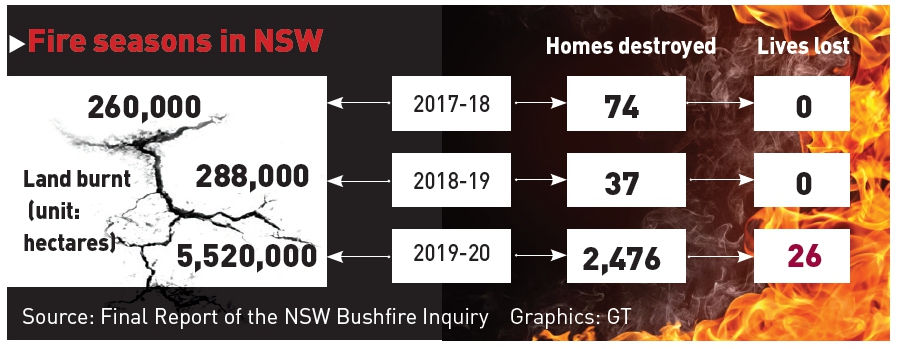Climate change 'clearly' fueled Australia bushfires: inquest
Source: AFP Published: 2020/8/26 19:38:40
Australia's devastating 2019-20 bushfires were "clearly" fueled by climate change, a government inquiry reported Tuesday following some of the largest forest fires ever recorded worldwide.

With 2020 fire season already underway, authorities recommended urgent action to limit the impact of extreme blazes, expected "to become more frequent" in the future.
The deadly bushfires raged for nine months to March and were most severe in New South Wales state, where 11,000 fires burned over 5.5 million hectares - the size of many countries. After months of consultation and expert testimony, the New South Wales (NSW) government on Tuesday published a 436-page report on the crisis that destroyed more than 2,400 homes in the state and left 26 people dead. The text included dozens of recommendations and featured a blunt rebuke of those who insisted the fires had nothing to do with climate change.
"Climate change as a result of increased greenhouse gas emissions clearly played a role in the conditions that lead up to the fires and in the unrelenting conditions that supported the fires to spread," it read.
The report noted it was impossible to say what precise role climate change had played in producing the complex range of climatic conditions that helped fuel the fires. Those conditions included a years-long drought, high winds, thunderstorms and low humidity. While cautioning that "climate change does not explain everything that happened," the authors noted that the catastrophic conditions were "consistent with what climate change projections have been saying will happen."
"Extreme fires and fire seasons are likely to become more frequent," they warned.
The report also rubbished suggestions by those opposing action on climate change.
Newspaper headline: Greenhouse gas blamed in NSW

With 2020 fire season already underway, authorities recommended urgent action to limit the impact of extreme blazes, expected "to become more frequent" in the future.
The deadly bushfires raged for nine months to March and were most severe in New South Wales state, where 11,000 fires burned over 5.5 million hectares - the size of many countries. After months of consultation and expert testimony, the New South Wales (NSW) government on Tuesday published a 436-page report on the crisis that destroyed more than 2,400 homes in the state and left 26 people dead. The text included dozens of recommendations and featured a blunt rebuke of those who insisted the fires had nothing to do with climate change.
"Climate change as a result of increased greenhouse gas emissions clearly played a role in the conditions that lead up to the fires and in the unrelenting conditions that supported the fires to spread," it read.
The report noted it was impossible to say what precise role climate change had played in producing the complex range of climatic conditions that helped fuel the fires. Those conditions included a years-long drought, high winds, thunderstorms and low humidity. While cautioning that "climate change does not explain everything that happened," the authors noted that the catastrophic conditions were "consistent with what climate change projections have been saying will happen."
"Extreme fires and fire seasons are likely to become more frequent," they warned.
The report also rubbished suggestions by those opposing action on climate change.
Newspaper headline: Greenhouse gas blamed in NSW
Posted in: ASIA-PACIFIC,WORLD FOCUS